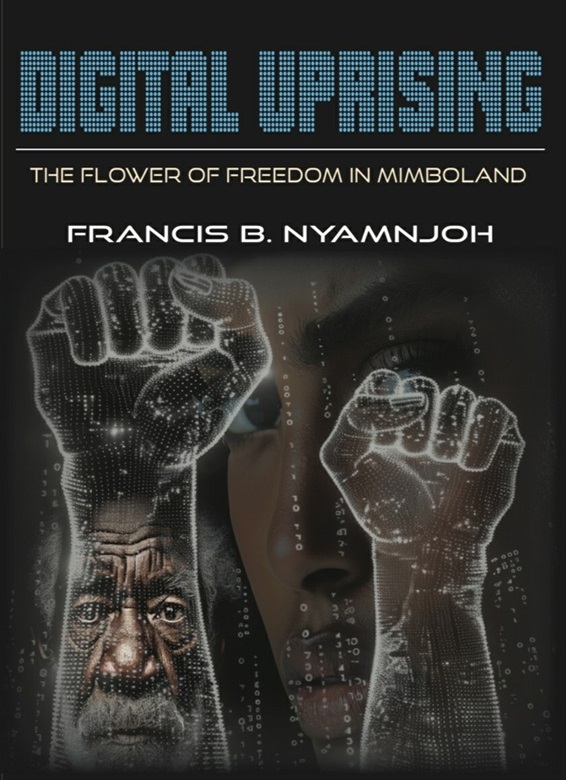Review of Francis B. Nyamnjoh’s Digital Uprising: The Flower of Freedom in Mimboland, Langaa, 2024, ISBN: 9789956554775, 236 pages.
Reviewer: Effiom Mbong
Francis B. Nyamnjoh’s Digital Uprising: The Flower of Freedom in Mimboland is a captivating satire that throws us headfirst into the fictional African nation of Mimboland. Here, President Longstay, a dictator who artfully blends the “material and the mystical”, has clung to power for over six decades. The novel’s opening scene is a masterstroke of deception, as Longstay stages his death in a Machiavellian manoeuvre to further tighten his grip on the nation. Little does he know, his daughter, Liberté, is the driving force behind a burgeoning rebellion, igniting a “digital uprising” through the power of social media and a clandestine network of activists known as the Liquid Army.
Nyamnjoh masterfully weaves the theme of ethics throughout the narrative and examines its implications for both leadership and technology. Longstay’s regime is a caricature of unethical governance, rife with corruption, human rights abuses, and blatant disregard for the well-being of his people. In stark contrast, Liberté and the Liquid Army represent beacons of ethical leadership, and their actions are guided by the principles of freedom, justice, and accountability. Even nanobots, initially introduced as tools for surveillance and manipulation, become instruments of change, subtly nudging the populace towards defiance and ethical behaviour.
Nyamnjoh’s exploration of ethics transcends the political arena and delves into the moral complexities of technological advancement. The nanobots, with their capacity to influence human behaviour, raise profound questions about the boundaries of intervention and the potential for manipulation. This novel prompts us to grapple with the ethical implications of using technology to shape society, even when driven by seemingly benevolent intentions.
The moral examination is further enhanced by the personal development of the characters. The First Lady, who initially supported Longstay’s administration, experienced a significant change. Her newly discovered compassion and moral awareness prompted her to re-evaluate her previous behaviour and seek atonement. In a similar vein, the Architects of Change, who developed the nanobots, confront the unforeseen ramifications of their invention, with their internal conflicts echoing broader societal discord.
Nyamnjoh’s writing is a delightful blend of satire and poignancy. His prose is infused with a playful irony that highlights the absurdity of Longstay’s actions, while underscoring the resilience and moral courage of those who resist him. The dialogue is particularly engaging, capturing the diverse voices and perspectives of characters with authenticity and humour. The narrative fearlessly explores the complexities of the human condition, treating the themes of greed, betrayal, and the struggle for self-determination.
Throughout the book, one finds astute remarks on human nature, frequently conveyed through proverbs and maxims.
“The impossible is not Mimbolandish.”
“A tree that doesn’t bend in the wind will break.”
“Those who refuse to heed advice will learn through hardship.”
These sayings, woven into the narrative, underscore the novel’s exploration of ethical dilemmas and importance of moral fortitude in the face of adversity
Digital Uprising is more than just a critique of political tyranny; it is a profound meditation on the ethical challenges facing humanity in the digital age. Nyamnjoh’s masterful storytelling, combined with his insightful exploration of the human spirit, makes this novel a compelling reading for anyone interested in the intersection of politics, culture, and technology. It serves as a powerful reminder that the pursuit of freedom is an ongoing struggle that demands vigilance, ethical leadership, and an unwavering commitment to justice and equality.
The novel’s conclusion leaves the reader with a lingering sense of hope and uncertainty. The tyrant falls, but the nanobots remain, and their true purpose is shrouded in mystery. Mimboland’s future hangs in the balance, its destiny shaped by the delicate dance between freedom and control, and between technological advancement and human autonomy. Digital Uprising is not just a story about an African nation; it is a reflection of the challenges and opportunities facing humanity in the digital age, a mirror reflecting the intricate tapestry of power, technology, and the abiding pursuit of freedom.

